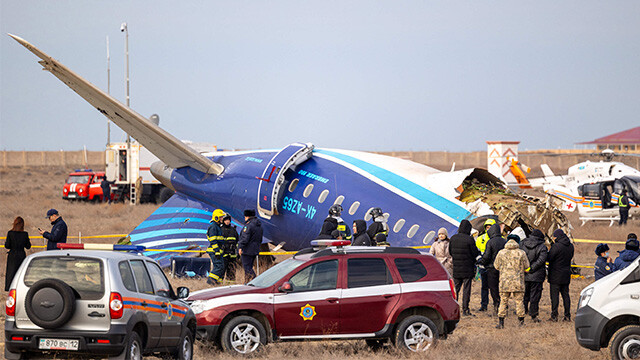
Almaty, Kazakhstan – A preliminary investigation into the crash of an Azerbaijan Airlines passenger jet in Kazakhstan has concluded that the aircraft was likely struck by a Russian anti-aircraft missile or its fragments.
The Azerbaijan Airlines J2 8243 flight, en route from Baku to Grozny, Russia, came down near Aktau, western Kazakhstan, on December 25. Initial reports suggested various causes, including a mid-air collision and severe weather conditions. However, aviation experts and Western officials raised concerns about the possibility of a missile strike based on the damage to the aircraft.
According to the Wall Street Journal, Azerbaijani authorities have determined that the plane's GPS was jammed, forcing it off course. Sources familiar with the investigation suggested that Russia was responsible for this disruption. If confirmed, this incident would mark the second time in a decade that a civilian airliner has been downed by a Russian air defense system.
The crash occurred in the North Caucasus region of Russia, an area that has been targeted by Ukrainian drone attacks in recent weeks. The Russian Defense Ministry had claimed to have shot down dozens of Ukrainian drones in the days leading up to the incident.
Russia has denied any involvement in the crash, attributing it to a bird strike. However, the Kremlin's spokesperson, Dmitry Peskov, has cautioned against making premature conclusions.
The incident has raised tensions between Russia and Azerbaijan, which has maintained a pragmatic relationship with Moscow despite the ongoing war in Ukraine. Azerbaijan has also been strengthening ties with Israel in recent months.
"Azerbaijan expects not only an apology from Russia but also an explanation for why the pilots' landing requests were denied and why the GPS was jammed," said Zaur Sirajev, a researcher at the Carnegie Mellon University Eurasia Center.
The crash has claimed the lives of at least 38 of the 67 people on board, including citizens of Azerbaijan, Russia, Kazakhstan, and Kyrgyzstan.
[Copyright (c) Global Economic Times. All Rights Reserved.]






























